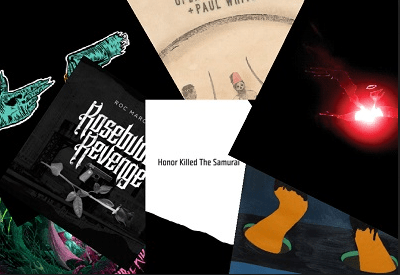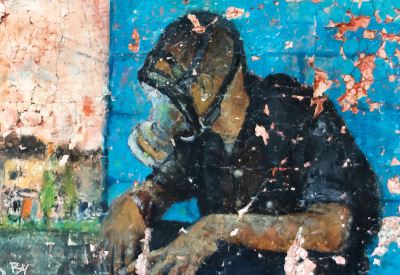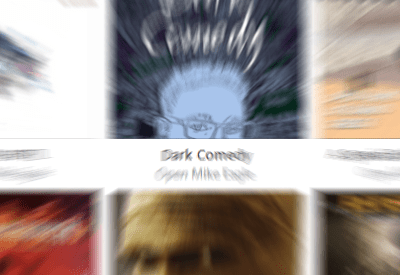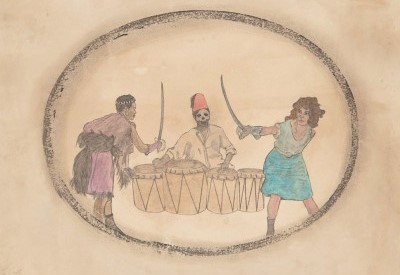by Dustin

The east coast has been a powerhouse in rap for as long as the genre is old. Under the surface, the east coast has developed some of the most unique underground acts of all time. Of these, Definitive Jux was one of the most notable throughout the 2000s. Lead by independent hip-hop star El-P, the Jux crew was consistently putting out their unique brand of experimental east coast rap.
Nearly seven years after the label was put on indefinite hiatus, those influenced by Definitive Jux are starting to find their own voice in hip-hop. MCrv is one of these rappers. A student of the independent hip-hop scene, MCrv spoke with us on life as a working class rapper, balancing family life, and how he sees his own music.
Read the interview below, and then go ahead and check out MCrv on Twitter, Bandcamp, and Facebook.
—
EN: I figure we should probably start with the basics to help people learn about you as an artist, if that’s okay with you. How long ago was it that you started rapping, and how did you get interested in it?
MCrv: I started rapping when I was about 15. I’m 25 now… So, ten years I guess. I didn’t really take it serious until I was 20 or 21. It was just for fun with two friends of mine, Dan and Tony. We we bored teenagers, [and] I was like: “lets make a rap song”.
Dan played drums, Tony did bass, and I rapped. They were [just] dumb songs about high school and partying. we stopped after five six songs until I turned 17 and a friend gave me a copy of Hell’s Winter and Labor days and I found out these dudes were making music themselves and rapping about all sorts of shit. I was fascinated. So my senior year of high school (2008-2009) I started learning how to use GarageBand and [my keyboard], and writing lyrics. And [I was also] discovering more artists on Definitive Jux and Rhymesayers, and anyone they collaborated with.
Some of my first ideas were made at the school computers in Manville High. Once I learned I could record at home, I was obsessed with saving for my own studio. [However], before I graduated I got into some trouble with my parents about abusing prescription pills. I left my parents house moved in with my grandparents because there was so much tension; everyone thought I had addiction problems. It was more experimental, but it didn’t matter [because] I broke their trust… It was hard after high school. I ended up doing out-patient rehab before I left New Jersey, and learned a lot about addicts. [I] realized I had potential to end up down that road, but never had the desire.
While all this drama was going on I kept [trying] ideas on my Yamaha keyboard, and recording vocals in Audacity with a ten dollar mic. I would record my beats off the keyboard speakers into Audacity then record my vocals [to] hear my ideas.
Some time went by and I decided to move to New York state with some family after living in New Jersey for 18 years. [Mostly] to start fresh and find some solid ground, since things were rough with my immediate family. I got a job and stayed focused on saving money. Within a year I saved enough money to buy myself an iMac and Pro Tools! I also picked up an Axiom 49 and I started to teach myself how to record using Pro Tools when I was about 19.
EN: That’s pretty crazy, so now have you got yourself a little home-studio setup? I noticed listening to your tape that it was super clean quality wise, moreso than I notice from a lot of rappers on the do-it-yourself path.
MCrv: Yeah, I have my own set up at home, and thank you. I’ve worked really hard to show progress in the quality of my music. My set up is realy simple: two monitors, an interface, an Axiom 49, and I switched recently from Pro Tools to Logic which has been great. I have a mic that I record my rough vocals on at home, but for all my final vocal tracks and final mixing I go to my friend Jim Servedio at his home studio and he puts his ears and hands in… He actually sold me my equipment when I moved to New York six years ago, and he’s been helping me with my mixes and recording ever since. [Jim] has been working with music and studios for almost 30 years, and we have a natural chemistry in the studio as far as what we are looking for sound wise. It hasn’t been easy, but he’s been patient and has allowed me to grow at my own pace.
EN: It’s great you’ve got a bit of a mentor in that regard though; to me, it seems like audio quality holds back a lot of young artists. You’ve already surpassed that hurdle. Moving onto influences for a moment, I remember when I first messaged you we talked about Colors and Sounds having a bit of an early Definitive Jux sound. You kind of came up on artists from that era and roster, correct?
MCrv: I’m [just] really lucky to have Jim. He has helped me so much… I don’t think I would know as much about the actual process of music making if it weren’t for him.
Yeah, I feel like I got really into it all when None Shall Pass, I’ll Sleep When You’re Dead and Depart From Me were still fresh. People started realizing there was more to underground rap than what they previously thought. At least that was my take [on it].
EN: Man, you had to go and name drop I’ll Sleep When You’re Dead haha. That’s my favorite album of all time, by far. It got me through a really rough period in life. Anyway, more to the point. You’ve definitely got influences, but your style is very much your own. Is it important for you to develop a unique sound for yourself?
MCrv: That album helped me a lot too! [Particularly] during my teen years and early twenties. “The Overly Dramatic Truth” [off I’ll Sleep When You’re Dead] still brings me back to those feelings.
And yeah, it is very important for me to have a unique sound for myself. That’s what drew me to Def Jux so much. Each dude had their own style [and] their own niche that I could get lost in and appreciate. I study those things, and have found what I like in myself. I [try to] bring [that] out in my music, and find my own signature traits that make MCrv, MCrv.
I still find it fascinating that you were able to dissect my influences based on my music, because anyone who knows me, like my close friends, if you asked [them] “what rapper or label does mcrv appreciate?”, they would say Aesop Rock, Def Jux, or Rhymesayers [laughs].
EN: Ah man, when I heard it the first time I was like this dudes got a super unique sound but at the same time there’s a flavor to this music that I recognize. So I spun it again, and then put on Bazooka Tooth I think and I was like holy shit, he sounds like he could have been a Def Jukie back in the day [laughs].
MCrv: Dude, thats crazy! I told myself when I made Colors and Sounds that this was my Bazooka Tooth [laughs].
EN: Then at that point, because that’s where my music tastes are pretty firmly I needed to talk to you for the site [laughs]. Like, I feel that even though Def Jux was pretty big, you don’t see a lot of the new generation building on that sound. (even thought the indie scene is strong as ever). Would you agree?
MCrv: I would totally agree. I feel I hear a lot of underground and commercial elements mixed together in a lot of the new generation stuff. I feel like there is a lot of risk in the music those [Def Jux] artists put out. There is meaning in their every sound and word. The messages and subject matters are like nothing any other artists have touched. There is a very peculiar way they’ve made music that I really don’t hear in others.
EN: I guess you’re somewhat of a revivalist in that way then, because it feels like that era ended so abruptly [laughs]. So tell me a bit about the process of your album, how long did you work on it and such?
MCrv: [Laughs] That’s a sweet thought… Trust me, I would love to see that label shine through again. I’m no savior though, I just know who I have to pay my respects to because those dudes showed me life pretty much… They taught me about life.
I worked on Colors and Sounds for about a year. I recorded everything at home… I made all the beats first and then wrote each song. [I] rehearsed them at home, and once I knew them well enough I took them to Jims house. We mixed the beats there, [and] then I record my vocals in his booth and we sat and mixed them in together. We’d usually go back a few days later and mix [again], and then once we were happy with [it] we’d do a little mastering.
[Occasionally] I write lyrics before the beat, but most of the time I make a beat then write the song. I enjoy creating the scene first. The little world all this shit is about to be said in, [and] then I just say it.
EN: Was there a particular place the album came from emotionally, or were you creating purely on your drive to make music?
MCrv: I had made eight songs before Colors and Sounds. They were about my depression, my separation from my family, and songs about how I found music and how I made it home. Colors and Sounds was kind of my acceptance of all that, [plus] realizing I got past it and can move on. I was able to deal with my depression with certain songs like “Bangarang” and “When the Heart Unfolds”.
Other times I wanted to have fun and be creative like “Spacemandude – A Galactic Tale” where I came up with a story for “Spacemandude” who’s like a secret-agent-spaceman, [and his] rival “Supreme Cream”.
Then there is an actual love song called “Unexpected Beauty” that I made for my girlfriend, who is also the mother of my beautiful daughter. [This] later led to “Say Grace”, which is the last track on the album. I made [it] for my daughter Ramona Grace.
Emotionally I was everywhere a little bit. Us expecting a child changed my attitude and mindset from focusing on how to feel better about my surroundings and current being, to realizing I’m going to be a father.
EN: Is there a goal for you, as far as evolution as an artist? Do you want your sound to continually grow and evolve with each release?
MCrv: Yes of course, I feel growing and making progress is very important to me. In all aspects really. [From] the actual recording and technical parts, to actually capturing my feelings with instruments, to allowing myself to try new rhyme schemes. I feel I have evolved with each release. Every time I make a new project (or collection of songs) my goal is to not just make it better than what I previously made, but to [also] implement the new things I’ve learned. And also to do some of the things I didn’t fit in on the previous project.
I feel like my evolution has been real natural, and I make what I feel comfortable with.
EN: That’s really admirable, to feel comfortable with the sound you’ve developed but still be focused on evolving naturally. What’s next for you, do you think? Do you hope to release more albums going forward?
MCrv: Yeah, I’ve felt like I’ve developed my own style. I know what my beats sound like, and I know how they could sound if I keep making progress like I intend.
Right now I’m about to record a five song EP I have been working on. A friend of mine helped with some of the instrumentation for each song. I played with some random ideas when I first got Logic, and he would hear what I had so far and add a part. Then I would fit that in, and build the track. I plan on releasing it sometime early fall. Its called Cluttered Souls. Its probably my favorite thing I’ve made so far… there are a couple songs on there were I feel I stepped out of my box and spoke up.
Also I’ve been working on new beats. I’m constantly working on something. I don’t get a lot of beats sent to me. I have a few friends who I have some things in the works with, but nothing really solid. I have a few singles I wanna release too. Just some different things I have been experimenting with. So really I’m just continuing my journey…
I think my next real goal is to make an album. I have one planned out and am very excited to start building solid foundations. I have ideas already rolling, but that’s probably what will consume most of my time after summer is out and the seasons change.
EN: I saw on your Facebook that you do some live shows. What’s that experience like for you as an independent artist?
MCrv: Its been pretty awesome to perform. I’ve done a bunch of open mics around central New York and those have been fun. Its usually really quiet and I’m use to being the only rap act. Most of the time its people singing with an acoustic, singing behind a track, or reading poetry. When I wait my turn to go up I get anxious and excited, ’cause its my chance to change things up and create a new environment for ten minutes. People are pretty respectful. There isn’t a lot rapping, like I said, so its cool to see people listen and nod or move a little to the music even if rap isn’t their thing.
I did an open mic one night in Binghamton and I felt really good about my performance. My only goal that night was to have fun and feel good about my songs. I did just that and it went very well. This dude Chris who writes for the Carousel Paper asked me if I wanted to open for this band, Telekinetic Walrus, so I took that opportunity. That was fun too. I’m pretty private about things. I don’t have a lot of friends I have a few close ones, and if everyone has to work (including my girlfriend) I’m on my own [laughs]. So it was me [with] my backpack, some CDs, and a laptop with my set in a playlist. I met some people and greeted everyone then I sat quietly in the bar drinking a glass of water [laughs].
I don’t drink or go to bars so everyone’s drinking around me and I’m sitting there alone listening to music. When it came time to go up, I introduced myself and interacted with the people. Everyone was really loud [laughs], they were all drinking and socializing. They didn’t know me or what I had to offer so when I started doing my songs it was loud… Not to mention the sound man had no monitors for us to hear ourselves (let alone care about how anything sounded) so it was hard to hear my music.
I did feel really good about my performance and making sure the people were still with me in some way despite the fact they couldn’t care less about what I was doing [laughs]. There were a few people who were really interested and listening to what I was saying though. I had a guy come up to me and thank me for what I did. He told me he really related and heard where I was coming from. We talked for a bit about how much time it takes to make music and all that then asked me for a CD, and a few other people grabbed CDs. Its been a pretty good experience so far. I really focus on performing my best and approaching people with a sincere and clear presence to get them to feel something.
EN: Is it intimidating to put yourself out there, in live shows, as a smaller-scale independent artist?
MCrv: Initially it was. A lot of that was because all my music and performing falls on me. I would be nervous because I had doubt’s like “what could one dude doing all this on his own have to offer people”? But once I got more comfortable with myself and people’s reactions when I perform, I realized there was nothing to be afraid of except not continuing to grow as an artist and overcoming [those] fears.
I mean, certain aspects are still intimidating. I’m not very well known or anything. When people go from listening to a song or two, then all I hear is talking during my performance, it kinda crushes you a bit… But, I try not to let it discourage me too much. Plus there are usually a few people who really are paying attention. All I can do is my best, and appreciate the time I get.
Which I do, very much [laughs].
EN: As a working class rapper, do you find it hard to balance other responsibilities while also finding time to work on your art?
MCrv: Yeah, sometimes it is difficult to balance everything. My girlfriend and I both work full time. The days she works late it is just my daughter and myself at home. Once I’m outta work I make sure the house is picked up, my animals are fed and watered, and I make sure my daughter is happy and full at all times.
Its been a bit of an adjustment since I’ve become a father. I could have plans to work on a beat or write and if Ramona needs to be fed, or she just simply wants me to hold her I put my music aside until I feel she is content. I wouldn’t trade any of it for anything though.
It’s hard work coming home from a job, raising a family, and trying to build something that’s going to last a lifetime (or at least hope it does), but it’s all worth it. I feel all the responsibility and pressure has helped me grow as a person. I have been able to value my personal time, and the time I have with my family. Once you find a routine (and make changes to that routine as new things arise) that sense of fulfillment is like no other. At least that’s what I’ve come to learn.
I’ve always been pretty disciplined with my music making and managing my time. Ask any of my friends [laughs]. They haven’t seen me in two months because I’m focused on my next project. I write myself lists of what I need with each song, and ideas I want to incorporate so I don’t have to think about it as much when I’m not working on them. Any little thing I can do to help keep organized I try to utilize.
EN: I respect that so much, the determination to still put in work musically while making sure your daughter comes first. That’s something I can never say anything bad about. Okay, now I’ve gotta ask the question I ask everyone as we wrap this up. Who are your five dream collaborations, dead or alive?
MCrv: I appreciate that man, thank you.
[Laughs] I’ve never thought about that much. I’m always like “my heroes don’t wanna fuck with me” [laughs]. Aesop Rock for sure. I always dreamed about him rapping on one of my tracks when I felt I was ready. I don’t think I’ll ever be ready [laughs].
I would also love to do a song with Blueprint. He’s been someone I listen to and followed for years. 1988 was an album I rapped along to when I really started taking song crafting more serious.
MF DOOM as well. I love all his music no matter what alias.
I would really love to do a song with Busdriver. That dude has the craziest beats and flows and I feel like that would be a challenge.
Blockhead would be another one for me. He use to make beats for Aesop, and has made great instrumental projects and other collaborative albums that rock.
EN: Ah man, I know I said we were closing it up but I have to ask this too because I’m a huge Busdriver fan and I see so little discussion about him. What’s your favorite album of his? I’ve been in love with Perfect Hair since it dropped, and Temporary Forever is a classic.
MCrv: Oh man, I really love both those albums. RoadKillOverCoat is probably my favorite album by Busdriver, [it has] so many great songs. Thumbs was great as well one of the best albums of 2015 hands down.
EN: Thumbs was dope too! I actually bought the cassette release of it, it’s pretty sick. Alright man, it’s time for the final question, but first I’d just like to really thank you again for doing this. If you had to describe what you bring to the table as a rapper (to convince someone to listen) what would you say?
MCrv: Well thank you my man for taking the time to get to know me a little, and [for] taking interest in the music and process. I very much appreciate it, its been fun having you throw questions at me.
To answer your question, I would have to say change. I usually write about things I’m going through or circumstances that need to change or evolve if you will. I am always striving to make natural progress with what I have in this life, and change is a part of that on a constant basis. I feel each song I tackle something I’m adjusting to, or I am accepting about the world or myself.
When I finish a song I feel grounded. I feel like the person I know I can be, want to be, and will be as long as I continue to learn and make adjustments (change) when necessary. I’ve always been a dude to make plans with set times and deadlines. That works to a degree, but there is always a natural flow of things and left turns to be made when least expected.









